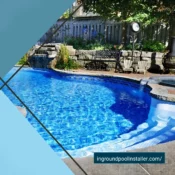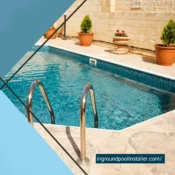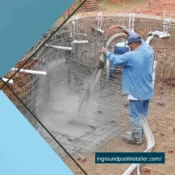Custom Pool Materials: What Your Inground Pool Builder Wants You to Know

Custom Pool Materials: What Your Inground Pool Builder Wants You to Know
In the realm of inground pool builder, the choice of materials can significantly impact both the functionality and aesthetics of your custom pool. Your builder will likely present you with options such as concrete, fiberglass, and vinyl liner, each offering distinct advantages tailored to specific needs. Concrete pools are renowned for their durability and limitless design potential, while fiberglass pools boast rapid installation and minimal upkeep. Vinyl liner pools, on the other hand, offer a cost-effective solution with diverse stylistic possibilities. However, the ultimate decision hinges on several critical factors that merit closer examination to ensure your pool's longevity and appeal.
Material Options and Their Benefits
When considering the construction of inground pools, selecting the right material is crucial for ensuring durability, aesthetics, and functionality. Each material offers unique attributes that contribute to the pool's longevity and visual appeal. Concrete, fiberglass, and vinyl are the predominant materials utilized in pool construction, each with distinct advantages.
Concrete pools are highly favored for their robustness and customization. They offer unparalleled flexibility in design, allowing for an extensive range of shapes and sizes, ideal for those seeking a bespoke pool experience. The durability of concrete ensures that the pool withstands various environmental conditions, providing a long-lasting option for homeowners.
Fiberglass pools, on the other hand, are appreciated for their quick installation and low maintenance. These pre-fabricated shells are installed directly into the ground, minimizing construction time. Their non-porous surface resists algae growth, reducing cleaning efforts and chemical usage.
Vinyl liner pools are known for their cost-effectiveness and smooth surface. Offering a wide variety of patterns and colors, they cater to diverse aesthetic preferences. While the liners require periodic replacement, advancements in material technology have extended their lifespan significantly.
Selecting the appropriate material aligns with personal preferences and community standards, ensuring a harmonious integration into homeowners' lives.
Factors to Consider
Several critical factors demand careful consideration when selecting materials for inground pool construction. Primarily, the pool's location and climate significantly influence material selection due to varying environmental conditions. In regions with harsh winters, materials must withstand freeze-thaw cycles, while in warmer areas, UV-resistant materials are paramount to prevent degradation. The soil type also plays a pivotal role; for example, expansive clay soils may require more flexible materials to accommodate shifting without cracking.
Durability and maintenance are equally vital factors. Opting for materials that offer longevity with minimal upkeep can enhance the pool's lifespan and reduce long-term costs. Materials like concrete and fiberglass are favored for their resilience and ease of maintenance.
Aesthetic appeal is another consideration, as the pool's visual integration with its surroundings enhances property value and owner satisfaction. Customizable materials such as tiles and natural stone offer unique design opportunities.
In conclusion, selecting the appropriate material for a custom inground pool builder is akin to laying the foundation of a masterpiece, where each option—concrete, fiberglass, or vinyl liner—offers distinct advantages tailored to specific needs. The decision should be guided by a meticulous evaluation of factors such as geographic location, climate resilience, durability, maintenance requirements, and aesthetic appeal. Ultimately, an informed choice ensures the creation of a pool that stands as a testament to both beauty and longevity.
All Categories
- Concrete
- Concrete
- Concrete pools
- Construction
- Custom Features and Add-ons
- Design
- Design
- Design
- Design & Construction
- Design and Planning
- Features & Customization
- Infinity edge
- inground pool
- inground pool builder
- inground pool installer
- Installation
- Installation Process
- Legal & Administrative
- Materials
- planning and design
- Pool Aesthetics and Customization
- Pool Design
- Pool Equipment
- Pool Features
- Pool Features
- Pool Installation Process
- Pool Materials
- Pool Materials
- Pool Types
- Project Planning
- Renovation
- Resurfacing
- top sights
- Types of Inground Pools
- Types of Inground Pools
- Types of Inground Pools
- Types of Inground Pools
- Water Treatment



